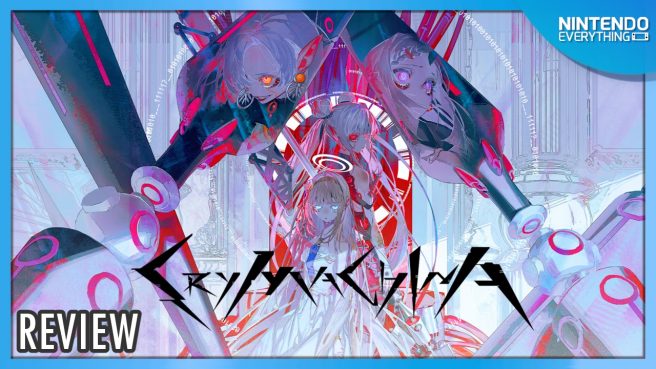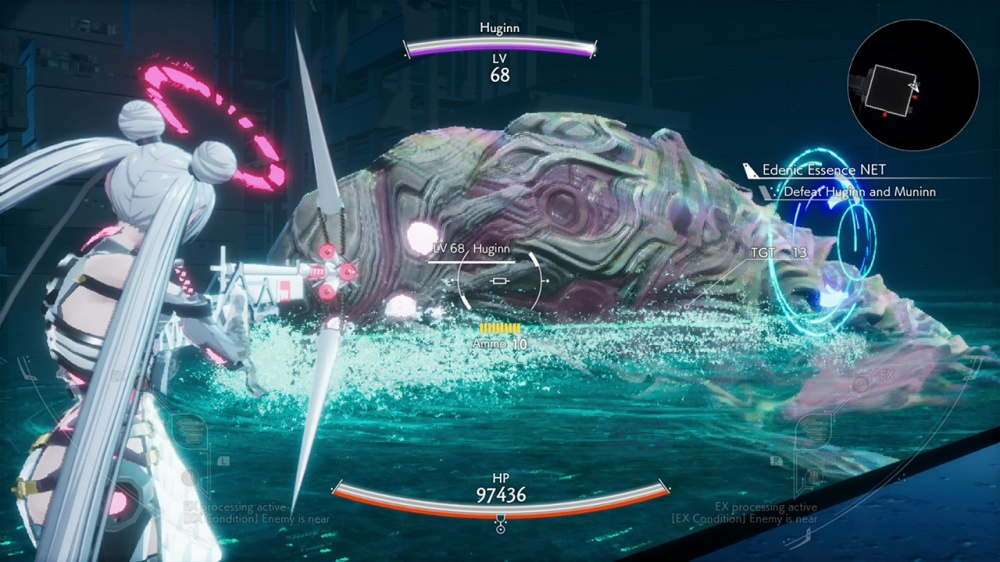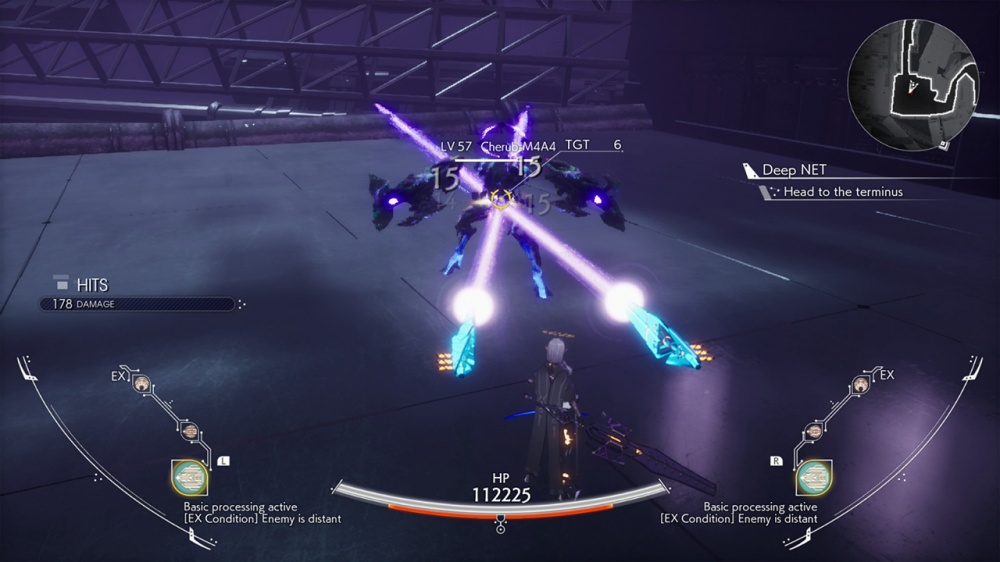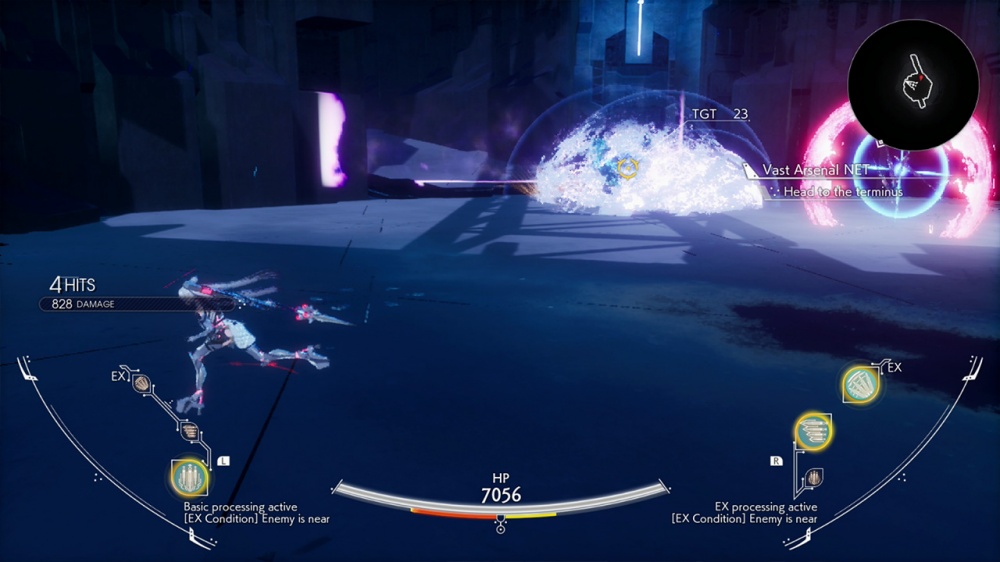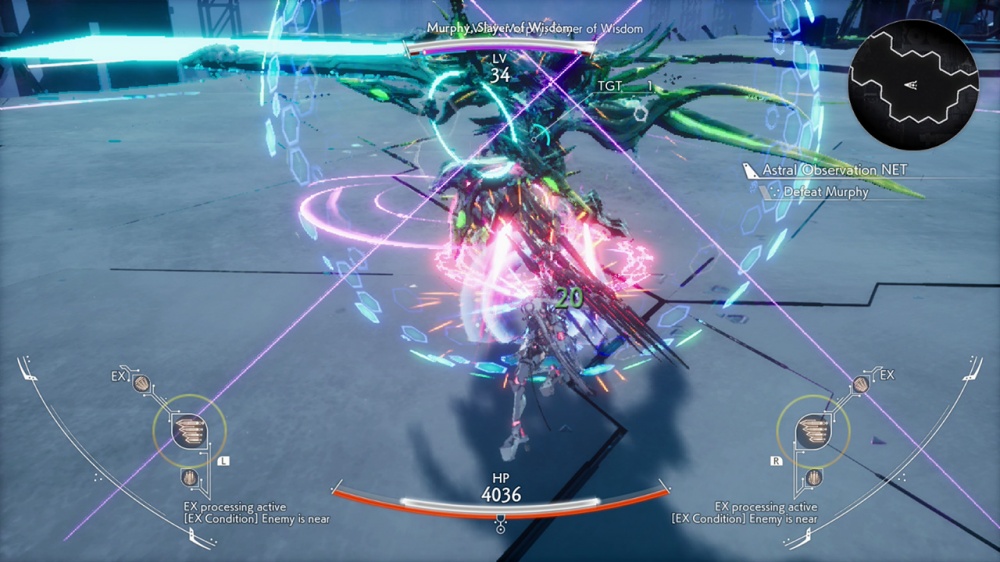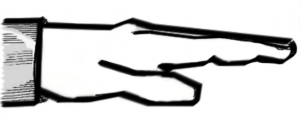System: Switch
Release date: October 24, 2023
Developer: FuRyu
Publisher: NIS America
Although not the biggest company out there, developer FuRyu has arguably made a little more of a name for themselves over recent years, bringing titles such as Monark and The Caligula Effect to the Switch with mixed reception. Crymachina is the latest game from the developer, an action RPG that acts as a sort of spiritual successor to their previous attempt at the genre, Crystar. Unfortunately, although Crymachina has a strong, well-developed narrative, its combat fails to make a lasting impression, making it another middling attempt that may be best avoided.
Two thousand years ago, humanity drove itself to extinction as the result of a war, but not before launching a spaceship, Eden, in the hopes of preserving their species. Eden was equipped with eight self-evolving, artificial life-forms, which unfortunately strayed from their programming over the years and are now threatening the survival of humanity. One of them who hasn’t gone insane, Enoa, decides to resurrect the consciousness of three humans stored in the machine, to pacify her brethren and return Eden to its correct functionality. One of them, and our central protagonist, is Leben Distel, who finds herself thrust into the role of the Chosen One as she is revived in a robot body and tasked with pacifying the remaining seven AI so that they will recognise her as a Real Human and allow her to gain control of Eden’s operating systems.
Crymachina throws a lot of techno-babble and vague science-fiction jargon at you right out of the gate, and the first couple of hours can be quite confusing, but it explains things in a surprisingly easy-to-digest and organic fashion, taking advantage of Leben’s cluelessness to do it in the simplest way possible, although likening it to an RPG may be a little too on point at times and does make the whole thing feel more ridiculous than it needs to at times. Most of Crymachina’s story and character development takes place in the Imitation Garden, a safe haven designed by Enoa to house the consciousnesses of her three Chosen Ones when they’re not out in their robot bodies fighting to retake Eden, and a lot of your time in-game will be spent in the Tea Party section of the menu, reading dialogue both major and mundane between the three characters, in a very visual novel-esque fashion.
Although the writing in Crymachina is neither ground-breaking nor especially thought-provoking (although it certainly tries to be the latter sometimes) it never gets so wrapped up in trying to explain its heavier science-fiction tropes that it feels as though it’s straying away from the main point, and the narrative pacing is quite smooth despite the walls of text it throws at you. Character development is generally restricted to optional Tea Party events, allowing the player to focus on the narrative if that is their preference, and this was something I appreciated during my playthrough when events picked up and I wanted to see what was going to happen next, rather than watch as Mikoto and Ami tried and failed to make Leben a more likable character.
There is an interesting chemistry between the cast that makes even their more mundane interaction quite entertaining given the game’s post-apocalyptic setting, although a lot of the humor was likely unintentional, as everything is taken seriously in a way that you can only find in RPGs with such an absurd premise. To its credit, Crymachina takes the time to explore each member of its small cast and, although none of them develop significantly as the plot progresses, their personalities do become more defined as they interact with one another, and their reactions to their situation are all drastically different.
As a kinetic visual novel experience, Crymachina would have worked extremely well, as there is a lot of time devoted to building up a familial relationship between its characters and in establishing its post-apocalyptic setting, and the surprises it throws into its story may catch some players off guard. The other half of the gameplay is a little more involved, being a series of short missions into Eden’s various networks to pacify the other AI. You’ll be thrown into a series of linear pathways that will occasionally open into larger areas, where you’ll need to defeat a small number of generic enemy units to continue, and will face a slightly stronger boss at the end of the stage.
Combat is a basic hack-and-slash affair – you’ll mostly be pummeling enemies with standard attacks until you can launch them into the air, slamming them to the ground and then executing a Finishing Assault which may or may not actually finish them off, making the name a bit of a misnomer and not particularly satisfying as a result. You can also parry and dodge attacks, with bonuses for doing so with perfect timing, and enter an over the shoulder third-person shooting mode if enemies are outside of your attack range, although this has very limited practical application in most combat encounters where enemies will seek to close in on you immediately, and is usually more for activating switches in between battles to open up the path so you can continue.
Most combat encounters, even bosses, can be pushed through by just spamming regular attacks, and occasionally dodging wide area attacks that have a long windup period. You can also equip two Auxiliary units which will float alongside you and support you with special attacks if you choose to activate them. It injects a little variety into what is otherwise a very bare-bones and unrewarding combat system, but it never feels particularly necessary to do so due to the complete lack of challenge that comes from combat with any enemy at a level on par with your own. Crymachina also never bothers to explain what some of its unique parameters, such as Composure, actually do for your characters, which makes developing your party members outside of combat a bit of a guessing game at times: as well as ExP (referred to as “E Cross P” in dialogue) you’ll also receive EGO that you can pour into numerous different parameters and effects, with negligible increases for an extremely high cost and you would need to grind excessively to meet. The game often feels as though it should be a more complex and nuanced title, but is so lacking in challenge and explanation that its systems feel superfluous at best.
Fortunately, these missions tend last around ten minutes at most, and the path you need to take to reach your objective is fairly linear, with the occasional need to hit a switch or double back, and some side paths that can lead to enemies which are significantly stronger than you and clearly not intended to be beaten on your first run through the level. Beyond coming back to challenge these enemies there is little incentive to replay missions, although it becomes necessary in later stages of the game where enemy levels will suddenly spike. Unfortunately, your characters all share the same resources, and you will be required to use them in tandem during your first run of story missions, so you will often need to repeatedly play through earlier missions to grind enough ExP to keep all your party members at a consistently high enough level. There can be some satisfaction from mindlessly destroying enemies in combat, but overall I found that its shallow and repetitive nature made it feel more like an unwelcome break in the visual novel segments of the game, rather than an equal part of the experience.
As with the gameplay, Crymachina is a mixed bag when it comes to presentation. The game maintains an impressively stable frame rate during combat but it suffers for it quite dramatically from a visual standpoint, and this is not a game I would recommend anyone attempt to play in handheld mode because of this: enemies become an unpleasantly jagged, low-resolution blur that are quickly lost amongst the flashy particle effects of your weapons, making combat an indistinct mess where it can be quite difficult to distinguish what exactly is going on. Although this isn’t a problem in most combat encounters due to the game’s low difficulty, towards the end of the game it can become quite frustrating when an attack you cannot see hits you from out of nowhere, and some of the more spectacular and bizarre boss designs are ruined somewhat by the low resolution textures and blur. In docked mode the visuals fare slightly better, but still maintain that unpleasant blur.
Outside of combat the game fares significantly better, with beautifully rendered, high-quality cutscenes sprinkled in throughout, and fantastic partially-animated character portraits that, although they are slightly lacking in facial expression much of the time, breathe life into the voice acting and make the dialogue more engaging to listen to. The lack of an English dub is unfortunate, but almost all of the dialogue in Crymachina has Japanese voice acting, and the performances here are generally very strong and emotive, with Enoa being a particular highlight. Combined with the soothing and relaxing background music, the Imitation Garden segments of the game are a genuine pleasure to experience and I found that it all felt surprisingly cozy.
Given that Crymachina is more visual novel than action RPG, and that combat encounters are generally very short and quite easy as long as you keep up with leveling your characters, the disparity between visuals in combat and in the Imitation Garden might actually not be that big of a deal-breaker to your overall enjoyment of the game. Fortunately there is a demo on the eShop, and I would urge anyone who places any kind of emphasis on visual quality to test it out for themselves before committing to a purchase on Switch, as your mileage may vary. If you wish the experience the full visual spectacle of the game however, the Switch is not the platform to do it on.
The Verdict
Crymachina is a game of two drastically different halves. It has an interesting sci-fi story and strong cast of characters that are engaging and often entertaining, but this comes at the enormous caveat of shallow and repetitive combat, with some truly awful visuals. But if you’re looking for a strong narrative-driven sci-fi experience with a good (albeit sometimes a little overdramatic and cliche) cast of characters, there’s plenty to keep you invested here. Just be aware that you will, unfortunately, need to leave the Imitation Garden from time-to-time to mindlessly bash in some heads.
Crymachina review copy provided by the publisher for the purposes of this review.
